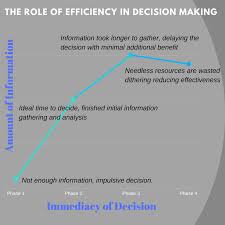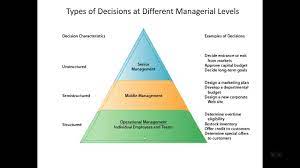Managerial Decision Making: A Key Aspect of Leadership
Managerial decision making is a critical aspect of effective leadership in any organization. Managers are responsible for making decisions that can have a significant impact on the success and growth of the company. Understanding the process of managerial decision making is essential for leaders to make informed and strategic choices.
The Process of Managerial Decision Making
Managerial decision making typically involves several key steps:
- Identification of the Problem or Opportunity: Managers must first identify the issue at hand that requires a decision to be made. This could be a problem that needs to be solved or an opportunity that needs to be capitalized on.
- Gathering Information: Once the problem or opportunity is identified, managers gather relevant information and data to analyze the situation thoroughly.
- Evaluating Alternatives: Managers then generate and evaluate various alternatives or solutions to address the problem or seize the opportunity.
- Making a Decision: Based on the analysis of information and evaluation of alternatives, managers make a decision on the best course of action.
- Implementation: After making a decision, managers must implement the chosen solution effectively within the organization.
- Monitoring and Evaluation: Managers continuously monitor and evaluate the outcomes of their decisions to ensure that they are achieving the desired results.
Factors Influencing Managerial Decision Making
Several factors can influence managerial decision making, including:
- Risk tolerance
- Cognitive biases
- Time constraints
- Organizational culture
- Ethical considerations
The Importance of Effective Managerial Decision Making
Effective managerial decision making is crucial for organizational success. It helps in achieving goals, solving problems efficiently, and seizing opportunities for growth. Strong leadership combined with sound decision-making skills can lead to improved performance and competitiveness in today’s dynamic business environment.
In conclusion, managerial decision making is an integral part of leadership that requires careful analysis, strategic thinking, and effective implementation. By understanding this process and considering key factors influencing decisions, managers can make informed choices that drive their organizations forward.
Understanding Managerial Decision-Making: Key Questions and Insights
- How do you make managerial decisions?
- Why is managerial decision-making important?
- What are the 3 types of managerial decisions?
- What is managerial decision level?
- What are managerial level decisions?
- What is managerial decision with example?
How do you make managerial decisions?
When it comes to making managerial decisions, a structured approach is often key. Managers typically begin by identifying the problem or opportunity at hand, followed by gathering relevant information and data to analyze the situation thoroughly. Evaluating various alternatives and solutions is a crucial step in the decision-making process, allowing managers to weigh the pros and cons of each option. Once a decision is made, effective implementation and continuous monitoring are essential to ensure that the chosen solution aligns with organizational goals. Successful managerial decision making also involves considering factors such as risk tolerance, cognitive biases, time constraints, organizational culture, and ethical considerations. By following a systematic process and taking into account various influencing factors, managers can make informed decisions that drive positive outcomes for their teams and organizations.
Why is managerial decision-making important?
Managerial decision-making is crucial for the success and effectiveness of any organization. The decisions made by managers have a direct impact on the company’s performance, growth, and overall strategic direction. Effective managerial decision-making ensures that resources are allocated efficiently, risks are managed effectively, and opportunities are seized in a timely manner. By making informed and well-thought-out decisions, managers can steer their organizations towards achieving their goals and staying competitive in an ever-changing business landscape. Ultimately, the importance of managerial decision-making lies in its ability to drive organizational success and sustainability in today’s dynamic and complex business environment.
What are the 3 types of managerial decisions?
In the realm of managerial decision-making, there are three primary types of decisions that managers commonly encounter. These include strategic decisions, which focus on long-term planning and goal-setting to ensure the organization’s overall success; tactical decisions, which involve more specific and short-term choices aimed at implementing the broader strategic plans effectively; and operational decisions, which deal with day-to-day activities and processes to keep the organization running smoothly. Understanding these three types of managerial decisions is essential for leaders to navigate complex challenges and drive their organizations towards achievement and growth.
What is managerial decision level?
Managerial decision level refers to the level within an organization where decisions are made by managers to guide the direction and operations of the company. This level of decision-making typically involves strategic choices that impact the overall goals and objectives of the organization. Managers at this level are responsible for analyzing information, evaluating alternatives, and making decisions that can have a significant influence on the success and growth of the business. The managerial decision level plays a crucial role in shaping the future of the organization and ensuring that it remains competitive in its industry.
What are managerial level decisions?
Managerial level decisions refer to the strategic choices made by managers within an organization that impact the overall direction, goals, and operations of the company. These decisions typically involve setting objectives, allocating resources, determining policies and procedures, and overseeing the implementation of plans to achieve organizational success. Managerial level decisions require a deep understanding of the business environment, industry trends, and internal capabilities in order to make informed choices that align with the company’s mission and vision. Effective managerial level decisions are essential for driving growth, optimizing performance, and ensuring long-term sustainability for the organization.
What is managerial decision with example?
Managerial decision-making refers to the process by which managers analyze information, evaluate alternatives, and make choices to achieve organizational goals effectively. An example of a managerial decision could be a company’s decision to launch a new product line based on market research and analysis of consumer trends. In this scenario, the managers would gather data on market demand, competitor offerings, and production costs to evaluate the feasibility and potential success of introducing the new product line. After careful consideration, the managers would make a decision on whether to proceed with the launch based on their analysis and strategic objectives. This example illustrates how managerial decisions are crucial in driving business growth and success.




